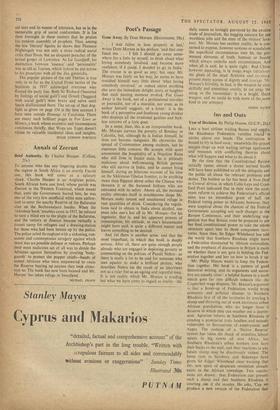Poet's Passage
Gone Away. By Dorn Moraes. (Heinemann, 18s.) . . I HAD fallen in love properly at last,' writes Dom Moraes in his preface, 'and that con- fused me. . . . I felt I should go away some- where for a little by myself, to think about what loving somebody involved. and become more confident, if I could. I decided to go to India.' The excuse is as good as any; but once Mr. Moraes was fairly on his way, he seems to have troubled himself very little about 'what loving somebody involved,' or indeed about anything else save the immediate delight, tears, or laughter that each passing moment evoked. For Gone Away is the book, not of a professional traveller or journalist, nor of a moralist, nor even, as its author himself suggests, of a lover: it is the book of a perceptive and footloose young drinker who displays all the irrational gaieties and feck- less sorrows of a lyric .poet.
In a sense, ,then, this is an irresponsible book. Mr. Moraes surveys the poverty of Bombay or Calcutta, but, although he is Indian himself, he does not become indignant. He chronicles the spread of Communism among students, but he expresses little concern. He accepts with quiet amusement the 'hospitality of a Nepalese Rana who still lives in feudal state; he is pitilessly malicious about well-meaning British persons who still survive in India; and he cannot bring himself, during an hilarious account of his time on the Sikkimese-Tibetan frontier, to be anything more than flippant about either the Chinese who threaten it or the harassed Indians who are entrusted with its safety Above all, the moment reality obtrudes itself in troublesome shape Mr. Moraes seeks instant and unashamed refuge in vast quantities of drink. Considering the regula- tions said to obtain in India about alcohol, one must take one's hat off to Mr. Moraes—for his ingenuity, that is, and his apparent powers of consumption; his attitude, as one's housemaster might have said, is quite a different matter and leaves something to be desired.
And yet there is another sense, and that the most important, in which this book is deeply serious. After all, there are quite enough people 'already who are engaged in deploring poverty or commenting on the policies of Pandit Nehru: so there is really a lot to be said for someone who uses squalor to make a brilliant picture, who describes Nehru (as the result of an interview) not as a ruler but as an ageing and regretful man. It is not reality which Mr. Moraes is evading but what we have come to regard as reality—the
daily scares so lovingly purveyed by the swollen trade of journalism, the nagging concern for our worthless jobs and the state of the visitors' lava- tory. Mr. Moraes has another reality; he is con- cerned to express, however noxious or scandalous the superficial circumstances may be, the per- manent elements of truth. humour or beauty which always underlie such circumstances. And when all is said, he is quite right: Red China, however menaeing, is in many:ways ridiculous; the ghats of the dead flyblown and re% olting. present many scenes of dignity and courage Mr. Moraes's frivolity, in fact, is the weapon he uses. skilfully and sometimes cruelly, to cut away the smug or the inessential,. it is a bright, Sharp weapon, and we could do with more of the same kind in our armoury
SIMON RAVEN


































 Previous page
Previous page